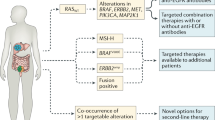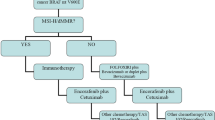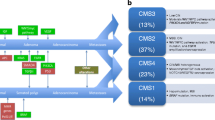Abstract
Colorectal cancer (CRC) is the second leading cause of cancer death in Western countries. CRC treatment is based on the employment of three chemotherapeutic drugs, including 5-fluorouracil, oxaliplatin and irinotecan, and the use of recently incorporated targeted agents directed to vascular endothelial growth factor (VEGF) and epidermal growth factor receptor (EGFR). The approval of these biologicals and of others to come holds great promise for the improvement of patient outcome. The molecular bases for this lethal disease have been extensively investigated, laying the foundations for a rational and customised treatment approach, expanding the therapeutic index of current drugs and easing the incorporation of new molecules. Individual markers have been mainly investigated based on drug targets and metabolism. Also, the increasing availability of high-throughput technologies has prompted the opportunity for blind studies capable of screening new markers and of identifying the specific oncogenic pathways responsible for drug resistance in a given patient. An updated review of the field is presented in this article.
Similar content being viewed by others
References
Jemal A, Siegel R, Ward E et al (2007) Cancer statistics, 2007. CA Cancer J Clin 57:43–66, 2007.
Andre T, Tournigand C, Mineur L et al (2007) Phase II study of an optimized 5-fluorouraciloxaliplatin strategy (OPTIMOX2) with celecoxib in metastatic colorectal cancer: a GERCOR study. Ann Oncol 18:77–81
Hurwitz H, Fehrenbacher L, Novotny W et al (2004) Bevacizumab plus irinotecan, fluorouracil, and leucovorin for metastatic colorectal cancer. N Engl J Med 350:2335–2342
Van Cutsem E (2007) Randomized phase III study of irinotecan and 5-FU/FA with or without cetuximab in the first-line treatment of patients with metastatic colorectal cancer (mCRC): the CRYSTAL trial. J Clin Oncol 25 (Abstract)
Fearon ER, Pardoll DM, Itaya T et al (1990) Interleukin-2 production by tumor cells bypasses T helper function in the generation of an antitumor response. Cell 60:397–403
Habermann JK, Paulsen U, Roblick UJ et al (2007) Stage-specific alterations of the genome, transcriptome, and proteome during colorectal carcinogenesis. Genes Chromosomes Cancer 46:10–26
Kinzler KW, Vogelstein B (1998) Landscaping the cancer terrain. Science 280:1036–1037
Rak J, Mitsuhashi Y, Bayko L et al (1995) Mutant ras oncogenes upregulate VEGF/VPF expression: implications for induction and inhibition of tumor angiogenesis. Cancer Res 55: 4575–4580
Allegra CJ, Paik S, Colangelo LH et al (2003) Prognostic value of thymidylate synthase, Ki-67, and p53 in patients with Dukes’ B and C colon cancer: a National Cancer Institute-National Surgical Adjuvant Breast and Bowel Project collaborative study. J Clin Oncol 21:241–250
Lenz HJ, Hayashi K, Salonga D et al (1998) p53 point mutations and thymidylate synthase messenger RNA levels in disseminated colorectal cancer: an analysis of response and survival. Clin Cancer Res 4:1243–1250
Edler D, Glimelius B, Hallstrom M et al (2002) Thymidylate synthase expression in colorectal cancer: a prognostic and predictive marker of benefit from adjuvant fluorouracil-based chemotherapy. J Clin Oncol 20:1721–1728
Pullarkat ST, Stoehlmacher J, Ghaderi V et al (2001) Thymidylate synthase gene polymorphism determines response and toxicity of 5-FU chemotherapy. Pharmacogenomics J 1:65–70
Marsh S, McKay JA, Cassidy J, McLeod HL (2001) Polymorphism in the thymidylate synthase promoter enhancer region in colorectal cancer. Int J Oncol 19:383–386
Villafranca E, Okruzhnov Y, Dominguez MA et al (2001) Polymorphisms of the repeated sequences in the enhancer region of the thymidylate synthase gene promoter may predict downstaging after preoperative chemoradiation in rectal cancer. J Clin Oncol 19:1779–1786
Johnston PG, Benson AB III, Catalano P et al (2003) Thymidylate synthase protein expression in primary colorectal cancer: lack of correlation with outcome and response to fluorouracil in metastatic disease sites. J Clin Oncol 21:815–819
Lyss AP, Lilenbaum RC, Harris BE, Diasio RB (1993) Severe 5-fluorouracil toxicity in a patient with decreased dihydropyrimidine dehydrogenase activity. Cancer Invest 11:239–240
Metzger R, Danenberg K, Leichman CG et al (1998) High basal level gene expression of thymidine phosphorylase (platelet-derived endothelial cell growth factor) in colorectal tumors is associated with nonresponse to 5-fluorouracil. Clin Cancer Res 4:2371–2376
Salonga D, Danenberg KD, Johnson M et al (2000) Colorectal tumors responding to 5-fluorouracil have low gene expression levels of dihydropyrimidine dehydrogenase, thymidylate synthase, and thymidine phosphorylase. Clin Cancer Res 6:1322–1327
Smorenburg CH, Peters GJ, van Groeningen CJ et al (2006) Phase II study of tailored chemotherapy for advanced colorectal cancer with either 5-fluouracil and leucovorin or oxaliplatin and irinotecan based on the expression of thymidylate synthase and dihydropyrimidine dehydrogenase. Ann Oncol 17:35–42
Westra JL, Hollema H, Schaapveld M et al (2005) Predictive value of thymidylate synthase and dihydropyrimidine dehydrogenase protein expression on survival in adjuvantly treated stage III colon cancer patients. Ann Oncol 16:1646–1653
Ribic CM, Sargent DJ, Moore MJ et al (2003) Tumor microsatellite-instability status as a predictor of benefit from fluorouracil-based adjuvant chemotherapy for colon cancer. N Engl J Med 349:247–257
Elsaleh H, Joseph D, Grieu F et al (2000) Association of tumour site and sex with survival benefit from adjuvant chemotherapy in colorectal cancer. Lancet 355:1745–1750
Allegra CJ, Kim G, Kirsch IR (2003) Microsatellite instability in colon cancer. N Engl J Med 349:1774–1776
Li XG, Haluska P Jr, Hsiang YH et al (1996) Identification of topoisomerase I mutations affecting both DNA cleavage and interaction with camptothecin. Ann N Y Acad Sci 803:111–127
Marcuello E, Altes A, Menoyo A et al (2004) UGT1A1 gene variations and irinotecan treatment in patients with metastatic colorectal cancer. Br J Cancer 91:678–682
Goetz MP, Reid JM, Safgren SL et al. UGT1A1*28 genotype determines the maximum associated tolerated dose and pharmacokinetics of irinotecan-based chemotherapy: a phase I dose-escalation trial. Proceedings of the 2007 GI Cancers Symposium, abst. 235.
Fallik D, Borrini F, Boige V et al (2003) Microsatellite instability is a predictive factor of the tumor response to irinotecan in patients with advanced colorectal cancer. Cancer Res 63:5738–5744
Stoehlmacher J, Park DJ, Zhang W et al (2002) Association between glutathione S-transferase P1, T1, and M1 genetic polymorphism and survival of patients with metastatic colorectal cancer. J Natl Cancer Inst 94:936–942
Arnould S, Hennebelle I, Canal P et al (2003) Cellular determinants of oxaliplatin sensitivity in colon cancer cell lines. Eur J Cancer 39:112–119
Shirota Y, Stoehlmacher J, Brabender J et al (2001) ERCC1 and thymidylate synthase mRNA levels predict survival for colorectal cancer patients receiving combination oxaliplatin and fluorouracil chemotherapy. J Clin Oncol 19:4298–4304
Stoehlmacher J, Ghaderi V, Iobal S et al (2001) A polymorphism of the XRCC1 gene predicts for response to platinum based treatment in advanced colorectal cancer. Anticancer Res 21: 3075–3079
Hayward RL, Macpherson JS, Cummings J et al (2004) Enhanced oxaliplatin-induced apoptosis following antisense Bcl-xl down-regulation is p53 and Bax dependent: genetic evidence for specificity of the antisense effect. Mol Cancer Ther 3:169–178
Bunz F, Hwang PM, Torrance C et al (1999) Disruption of p53 in human cancer cells alters the responses to therapeutic agents. J Clin Invest 104:263–269
Zhang L, Yu J, Park BH et al (2000) Role of BAX in the apoptotic response to anticancer agents. Science 290:989–992
Longley DB, Wilson TR, McEwan M et al (2006) c-FLIP inhibits chemotherapy-induced colorectal cancer cell death. Oncogene 25:838–848
Blume-Jensen P, Hunter T (2001) Oncogenic kinase signalling. Nature 411:355–365
Hebbar M, Wacrenier A, Desauw C et al (2006) Lack of usefulness of epidermal growth factor receptor expression determination for cetuximab therapy in patients with colorectal cancer. Anticancer Drugs 17:855–857
Moroni M, Veronese S, Benvenuti S et al (2005) Gene copy number for epidermal growth factor receptor (EGFR) and clinical response to anti-EGFR treatment in colorectal cancer: a cohort study. Lancet Oncol 6:279–286
Lievre A, Bachet JB, Le Corre D et al (2006) KRAS mutation status is predictive of response to cetuximab therapy in colorectal cancer. Cancer Res 66:3992–3995
Zhang W, Gordon M, Schultheis AM et al (2007) FCGR2A and FCGR3A polymorphisms associated with clinical outcome of epidermal growth factor receptor expressing metastatic colorectal cancer patients treated with single-agent cetuximab. J Clin Oncol 25:3712–3718
Giantonio BJ, Catalano PJ, Meropol NJ et al (2007) Bevacizumab in combination with oxaliplatin, fluorouracil, and leucovorin (FOLFOX4) for previously treated metastatic colorectal cancer: results from the Eastern Cooperative Oncology Group Study E3200. J Clin Oncol 25:1539–1544
Lenz HJ. Can we predict response to EGFR and VEGF inhibitors?. Proceedings of the 9th World Congress on Gastrointestinal Cancer (pgs 271–2)
Downward J (2006) Cancer biology: signatures guide drug choice. Nature 439:274–275
Mariadason JM, Arango D, Shi Q et al (2003) Gene expression profiling-based prediction of response of colon carcinoma cells to 5-fluorouracil and camptothecin. Cancer Res 63:8791–8812
Bertucci F, Salas S, Eysteries S et al (2004) Gene expression profiling of colon cancer by DNA microarrays and correlation with histoclinical parameters. Oncogene 23:1377–1391
Wang Y, Jatkoe T, Zhang Y et al (2004) Gene expression profiles and molecular markers to predict recurrence of Dukes’ B colon cancer. J Clin Oncol 22:1564–1571
Barrier A, Lemoine A, Boelle PY et al (2005) Colon cancer prognosis prediction by gene expression profiling. Oncogene 24:6155–6164
Del RM, Molina F, Bascoul-Mollevi C et al (2007) Gene expression signature in advanced colorectal cancer patients select drugs and response for the use of leucovorin, fluorouracil, and irinotecan. J Clin Oncol 25:773–780
Ghadimi BM, Grade M, Difilippantonio MJ et al (2005) Effectiveness of gene expression profiling for response prediction of rectal adenocarcinomas to preoperative chemoradiotherapy. J Clin Oncol 23:1826–1838
Watanabe T, Komuro Y, Kiyomatsu T et al (2006) Prediction of sensitivity of rectal cancer cells in response to preoperative radiotherapy by DNA microarray analysis of gene expression profiles. Cancer Res 66:3370–3374
Author information
Authors and Affiliations
Corresponding author
Additional information
Supported by an unrestricted educational grant from Sanofi-Aventis.
Rights and permissions
About this article
Cite this article
Casado, E., De Castro, J., Belda-Iniesta, C. et al. Molecular markers in colorectal cancer: genetic bases for a customised treatment. Clin Transl Oncol 9, 549–554 (2007). https://doi.org/10.1007/s12094-007-0102-8
Published:
Issue Date:
DOI: https://doi.org/10.1007/s12094-007-0102-8




